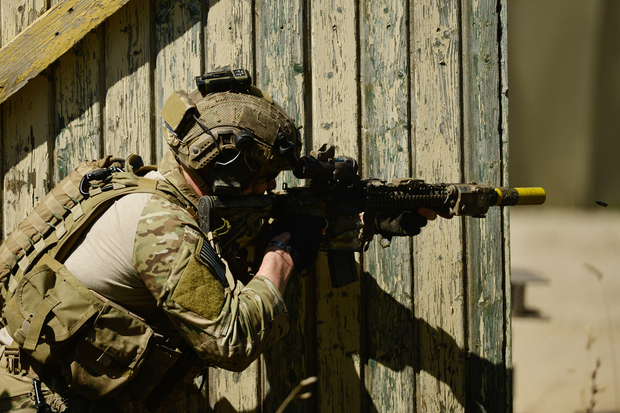US takes part on ground in the Saudi-led coalition war against Yemen: New York Times
YemenExtra
Y.A
The New York Times revealed that the United States has sent US troops to take part in the war against Yemen.
A team of Green Berets, the US army’s special forces, deployed to the kingdom’s southern border with Yemen in December the New York Times reported on Thursday.
In March 2015, Saudi Arabia and a coalition of its regional allies — mainly the united Arab Emirates and Jordan — started a war against Yemen with the declared aim of crushing the Houthi Ansarullah movement, who had taken over from the staunch Riyadh ally and fugitive former president Abd Rabbuh Mansur Hadi, while also seeking to secure the Saudi border with its southern neighbor. Three years and over 600,000 dead and injured Yemeni people later, the war has yielded little to that effect.
The Houthis,part of Yemeni joint forces, who are Muslims, have responded by launching ballistic missiles at military targets and cities in Saudi Arabia.
The Yemeni Supreme Revolutionary Chairman said that the announcement by the US Department of War “Pentagon” of its participation with its soldiers on the ground and in the protection of the Saudi border came to reassure the Saudi-led coalition , which has become recalcitrant and after Sudan’s willingness to withdraw from the war.
Around 50 US military personnel were known to be in Saudi Arabia assisting the kingdom with training and logistical support. But it is the first time the presence of US special forces and aircraft has been reported.
A number of US congressional officials confirmed during hearing sessions last month that they were receiving orders from Washington to help the Saudis to defend their borders, while Robert was admitted that the U.S sent 50 experts to help Saudi Arabia to deal with the threat of Yemeni missiles.
For its part, US Senator Tim Kaine, of the Armed Services Committee, said the mission was a “purposeful blurring of lines between train and equip missions and combat”.
Citing operational security, the Pentagon said it could not comment on the makeup of forward-deployed forces.
The Pentagon’s “limited non-combat support, such as intelligence sharing, focuses on assisting our partners in securing their borders from cross-border attacks from the Houthis,” military spokesman Major Adrian Rankine-Galloway said.
Last month, Robert S. Karem, assistant secretary of defence for international security affairs, told the Senate Foreign Relations Committee that roughly 50 American military personnel were in Saudi Arabia and were “largely helping on the ballistic missile threat”.
Nearly 600,000 people have been killed and injuried in the war since Saudi Arabia and its allies intervened in 2015. Western support for Saudi Arabia’s bombing campaign has been criticised by politicians and rights groups who say the strikes often result in civilian deaths.
As well as US military support, the Saudi air force has used British-made munitions to hit targets in Yemen and received training from British military personnel.
A report published last month says that there are around 200 UK personnel in Saudi Arabia supporting the Saudi armed forces. Their activities include military training and operational advice to the Saudi Air Force and other security forces.
The UK government has also approved £4.6 billion ($6.2 billion) of arms sales to Saudi Arabia since March 2015 when the intervention began. That included £2.7bn ($3.6 billion) of licences for aircraft, helicopters and drones, and £1.9bn ($2.5 billion) of licences for grenades, bombs and missiles.
A blockade imposed by Saudi Arabia on Yemen’s ports in November has also been criticised as exacerbating the country’s dire humanitarian situation. Malnutrition and cholera are rife among Yemeni civilians, particularly among those displaced by the war.
“Hodeida should be supporting more than 20 million Yemenis. It should be the source of at least 70 percent of all imports to Yemen,” Suze van Meegen, a protection and advocacy adviser with the Norwegian Refugee Council, told AFP.
Hudaydah is a strategic port city which the Saudi-led coalition has been eager to retake from Yemeni joint forces control. But the former UN special envoy to Yemen, Ismail Ould Cheik, warned against attacking the port city over potential catastrophic consequences to Yemen last year. Martin Griffiths, the new special envoy to Yemen, echoed the same concern over attacking Hudaydah at the UN Security Council this week.
The United Nations has called Yemen the world’s worst humanitarian crisis as the country stands on the brink of famine. The blockade has since been partially lifted but access to the country remains limited.
On Thursday, a study published in the medical journal The Lancet warned that Yemen’s oncoming rainy season may worsen the cholera epidemic.
More than a million suspected cases of cholera have been reported in Yemen since 2016, and more than 2,000 deaths. The United Nations says 22 million of Yemen’s 25 million population need humanitarian assistance.
#Yemen
#US
#SaudiArabia

